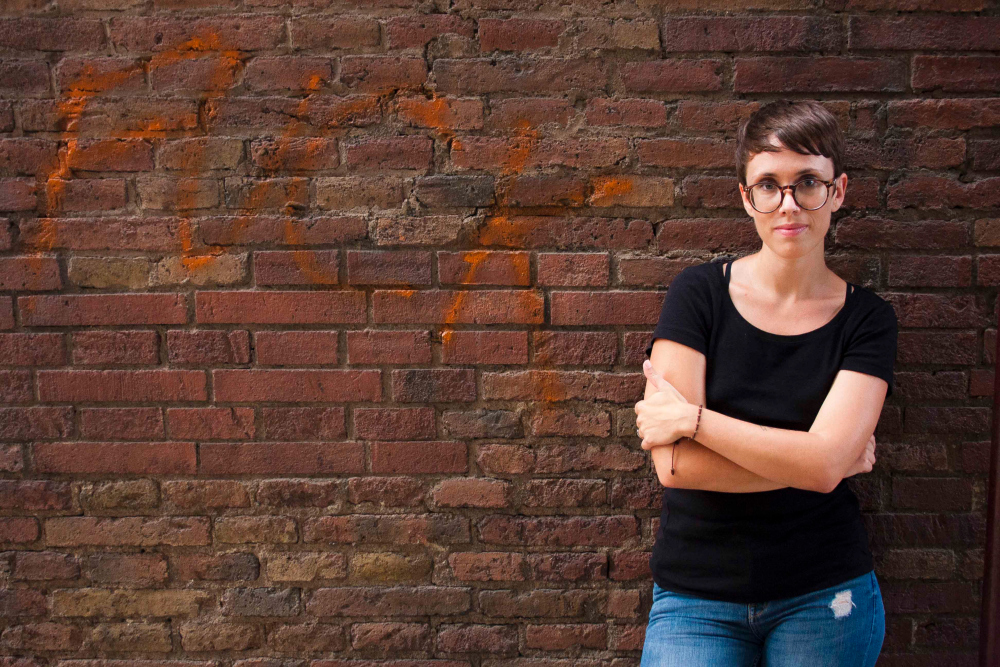
- Erika Irusta (Barakaldo, 1983) is a pedagogue, writer and feminist activist. It investigates and disseminates research on menstruation. In 2010 he launched the website El Camino Rubí and in 2015 he launched the educational platform Soy 1soy 4. He has also published two books: Journal of a Body (Cathedral, 2016) and Me mentrúo. A manifesto (Cathedral, 2018).

You work on menstruation pedagogy and you created the term. What do you mean?
The pedagogy of menstruation does not exist as an academic term and it seemed interesting to me to start an educational process to observe how menstruation appeared in the rest of the sciences. It should be understood that menstruation is multidimensional. We must be aware that, besides being physiological, what happens is that menstruation is a social, political and cultural experience.
It usually reads as follows: “Menstruation is beautiful, but it gives pain in this society.” What do you mean?
I wrote an article called Menstruation is beautiful and it came to people. Some liked it very much, but others got angry. They told me that they had a lot of pain and how I could say it. So I published the second part of the article. Menstruation is beautiful, but it paints this society. Gloria Steinem wrote in 1978 what would happen if men had a period. Because menstruation isn't a problem, it's a body that has that month. It is essential to take the context into account when talking about sexual experience. So you realize that the problem or what's wrong is not your hormones or your body, but that inherited misogynistic view. That's why it's hard to have a month in this society.
You mentioned the text of Gloria Steinem. It states that if men had menstruation it would be a desirable reality.
My head burst when I found this text. When I researched the rule of the rule, I didn't really know what I was looking for, and this text opened my eyes. The key is who gets menstruation, that is, what the political subject is. That is why I have included the text in the book. In addition, in this case I also offered the opportunity to collect a feminist genealogy.
There are many myths about menstruation.
The first myth is that women are made by lowering menstruation. That's terrible. In fact, our hormones are given a gender. Another myth is the femininity gene: for him, femininity is in our womb. It is now clear that this is not the case, as many of the women who have been removed from their womb are still women, but there is still that fear. However, one of the big myths is that menstruation has a pain. Menstruation doesn't hurt, and if it hurts, it's called dysmenorrhea. If men had one month, more research would be done and they would not be accepted to have pain. You wouldn't tell them, like us, that it's normal and it's going to happen to you. Finally, we have the blue blood or the blood of not guessing that we are with the rule. They let us run our blood, but always without splashing.

There's also a lot of controversy about birth control pills.
These pills interrupt our ovulation and you need to ovulate. I think we need to take the debate further and see where the pill comes from. It is linked to the Catholic Church and the Nazi genocide, but we have to see how the system becomes a tool of a misogynist and how we have internalized it.
Another controversy that exists is that of hygiene products.
When talking about this issue, it must be clear from what position of privilege we are talking about. I always give an example of what happened in Silicon Valley: they launched a campaign to encourage the use of the cup among women living on the street, to buy drinks for women living on the street. Then they realized that it didn't work well with these women, because to wear the cup you need a minimum of hygiene and a means to clean it well. It must therefore be borne in mind that the best option for us is not always the best option for all. For example, a friend of mine is in a refugee camp and he told me that there are women there who don't want to put anything in their neck, so the cup and the tampon don't serve them. It's important to have opportunities, and for that, we need to design those options ourselves, the people who have the rule.
You say we're cyclical bodies, and that hormonal and chemical changes inevitably influence our physical, mental and changing changes. How do we reconcile our cycling and our day-to-day life without leaving the system?
That's what I'm trying to guess. Doing so is only very difficult or impossible. That's why I created an educational community in the I.T. Web. Sometimes, when you become aware of your own cyclicity, you can feel frustration. Because you don't realize what's going on before, but then you do, and you still have trouble going ahead. The care networks, the environment of trust, and how not, the allies are essential to live our cycling in a healthy way.
professional and personal career led him to investigate the death of Erika Irusta. After finishing her pedagogical studies, she worked in Barcelona with women who had not given birth. Our lack of knowledge of our bodies seemed strange to him. Thus he began to research and teach courses in feminist pedagogy. At the same time, she became pregnant and lost her child. With this tremendous experience he realized that a child may not, but one month, that every month he would have to learn to live with him. So it began to give importance to menstruation.